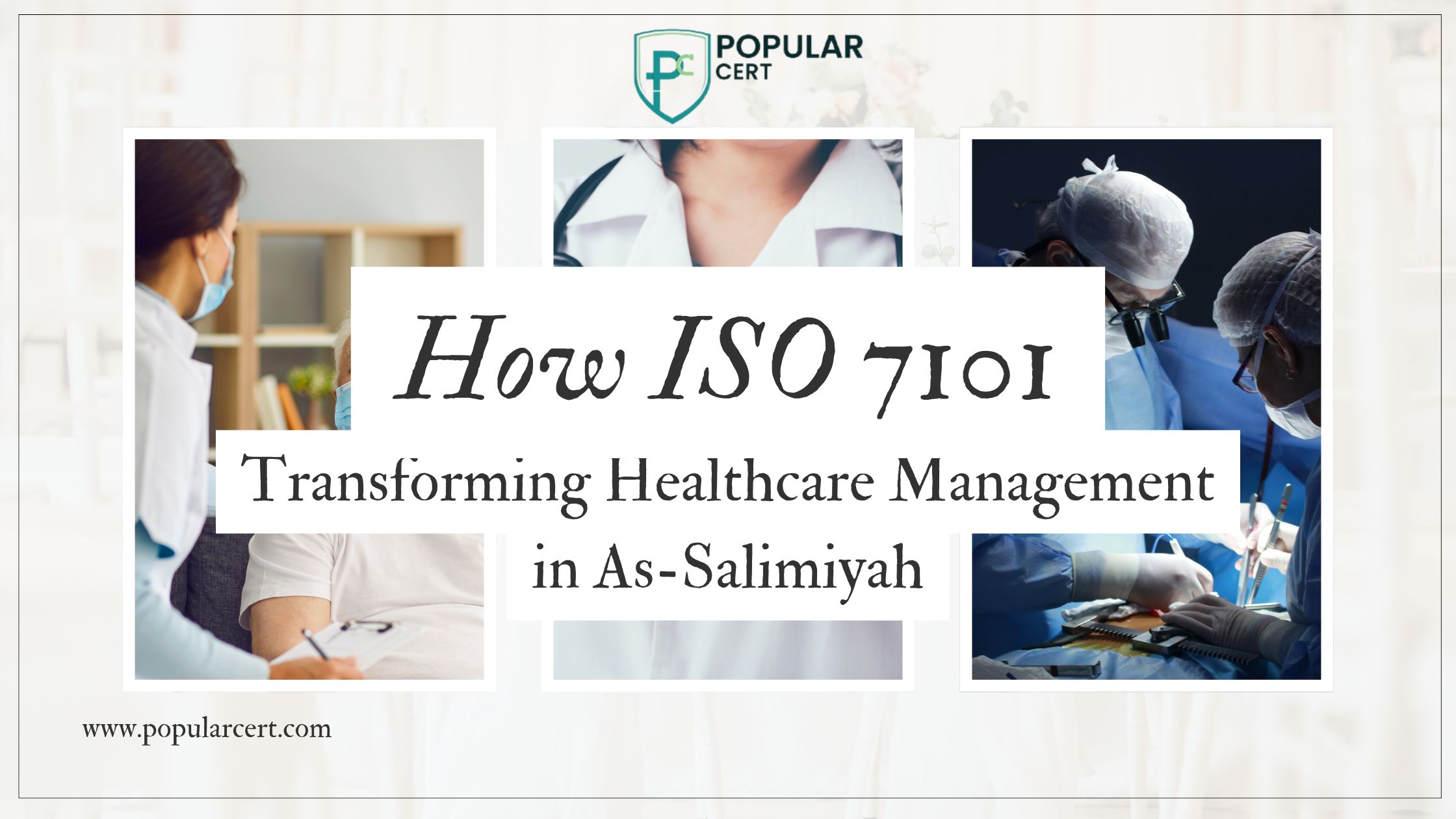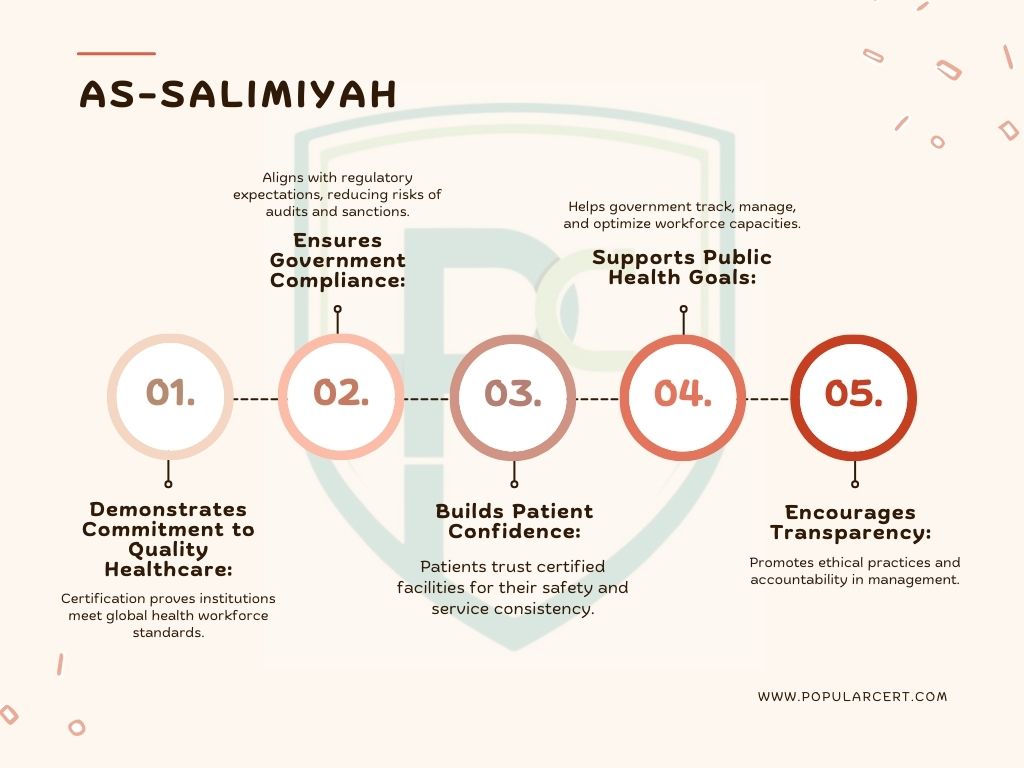How ISO 7101 Is Transforming Healthcare Management in As-Salimiyah

Introduction:
As-Salimiyah’s healthcare system is at the brink of a technological revolution as a result of the increase in population and the rate of urbanization in the town. There is a greater need for improvement in the management of services, which is well defined in ISO 7101. It will be of help in enhancing the clinics and hospitals workforce planning and improve the safety of patients. As patients along with government regulators have started to set keen interest in healthcare systems, understanding and practicing ISO 7101 is extremely important to healthcare providers if they wish to retain their customers in this competitive environment.
Growing Importance of ISO 7101 Awareness in As-Salimiyah’s Evolving Landscape
With the use of efficient techniques in healthcare, As-Salimiyah is considering applying them especially because this town is rapidly becoming urbanized. There is an urgent need to improve health workforce planning and overall delivery of service ISO 7101 will help achieve just that with the improvement provided in patient safety. People around the globe not only from the healthcare profession but from outside the field are becoming more aware about these standardized systems, and so are the patients. Hospitals are coming to realize that adoption of these standards go beyond mere compliance to regulations but facilitate the organizations in achieving efficiency and patient satisfaction.
Awareness of ISO 7101 Becoming More and More Crucial Day by Day in As-Salimiyah
- Growing Healthcare Demand: As-Salimiyah's expanding population increases the need for quality healthcare services.
- Lack of Standardized Workforce Management: Hospitals and clinics face challenges in efficiently managing human resources.
- Global Recognition: ISO 7101 brings international credibility to local healthcare facilities.
- Government Support Rising: The health ministry is focusing more on regulation and standard adoption.
- Patient Expectations Rising: Locals are now demanding better transparency and care quality.
Improved awareness and application of ISO 7101 could greatly improve the healthcare sector in As-Salimiyah. As government efforts for modernization begin to take effect, ISO 7101 provides a means for “catching up” as it serves as a global industry standard framework which best practices are modeled from. Facilities that are slow to adapt will risk running behind patient trust and compliance. Stakeholder participation, training workshops, and awareness campaigns will be critical in ensuring that the full capacity of the healthcare system’s value are achieved and in promoting rapid growth harnessed by the complete transformation of ‘s Healthcare sector.
Types Of Certification
- ISO Certification
- ISO 9001 Certification
- ISO 14001 Certification
- ISO 45001 Certification
- ISO 22000 Certification
- ISO 27001 Certification
- ISO 17025 Certification
- ISO 13485 Certification
- CE Mark Certification
- ISO 20000-1 Certification
- GMP Certification
- Halal Certification
- SOC-1 certification
- SOC-2 certification
Get Free Consultation
Our Clients


















How ISO 7101 Can Transform Hospitals and Clinics in As-Salimiyah Toward Better Healthcare Practices
As-Salimiyah’s hospitals and clinics can now improve service delivery by implementing ISO 7101. It primarily targets the health workforce, hence requires proper institution staffing, training and organization. With proper systems in place, facilities can expect higher service delivery standards, better inter-departmental coordination and improved service delivery time. Patient safety is prioritized through forming robust risk management, quality control and structured assurance systems in everyday processes.
How ISO 7101 Can Change Hospitals and Clinics in As-Salimiyah into Better Healthcare Practices
- Improves Workforce Planning: Ensures adequate staffing and skill levels across departments.
- Enhances Patient Safety: Standardised procedures that reduce medical errors and improve outcomes.
- Boosts Operational Efficiency: Streamlines administrative and clinical workflows.
- Strengthens Governance: Promotes accountability and structured decision-making.
- Fosters Continuous Improvement: Encourages regular assessments and updates to healthcare practices.
- Builds Public Trust: Certification signals commitment to quality care, increasing patient confidence.
Besides patient care, ISO 7101 improves internal governance by fostering an environment of responsibility and an ethos of “never-ending development”. Healthcare workers in As-Salimiyah will be able to manage skilled personnel retention with organized workforce solutions. Additionally, with the growing concern on the quality of services offered by the public and the government, the Hospital belongs to the modern leagues of responsible healthcare when burdened with the cost of delivering care becomes iso 7101 certified.
ISO 7101: A Growing Source of Trust for Both Customers and the Government in As-Salimiyah
In As-Salimiyah, ISO 7101 is gaining confidence as a mark of trust in addressing the effectiveness and dependability of the healthcare workforce. To the customers, ISO 7101 serves as evidence that a hospital or a clinic is properly staffed, has appropriate systems, and structures that enable them to give healthcare that is consistent, safe, and of good quality. This increases satisfaction and loyalty from patients, especially in urban areas where there is awareness and choice.
For the government, ISO 7101 serves as an aligned policy tool intended to ensure uniformity in standards across the public and private healthcare systems. It facilitates better regulatory control and is supportive to the national healthcare development strategy. Facilities with this certification become reliable partners in public health efforts and are therefore increasingly preferred for government sponsorship, grants, and emergency response networks.

Popularcert: Your Trusted Partner in Certification Consultancy
When we look at companies providing professional certification services, Popularcert specific consultancy comes on top. They ensure that clients do not get inconvenienced by providing consulting, training, audits, and also certifications at once. Having mastered multiple client standards like ISO, CE Mark, HACCP, Halal, BIFMA, GMP, RoHS, Popularcert meets the varying client needs by consolidating several certifications to serve the business needs.
Conclusion:
In conclusion, as As-Salimiyah’s healthcare sector evolves to meet the demands of a growing and more informed population, ISO 7101 emerges as a critical tool for hospitals and clinics seeking to ensure quality, efficiency, and trust. Its focus on structured workforce management, patient safety, and continuous improvement not only aligns with global best practices but also meets the rising expectations of both patients and policymakers. By embracing ISO 7101, healthcare providers can future-proof their operations, build lasting credibility, and position themselves as leaders in delivering modern, reliable healthcare services.
GET A FREE CONSULTATION NOW
FAQ
What is ISO 7101 and why is it important for healthcare facilities in As-Salimiyah?
ISO 7101 is an international standard focused on the management and planning of health organizations, particularly in relation to workforce efficiency, patient safety, and quality of care. For healthcare facilities in As-Salimiyah, it provides a structured framework to improve operations, enhance patient trust, and align with growing regulatory and public expectations.
How does ISO 7101 certification benefit hospitals and clinics?
Certification under ISO 7101 helps hospitals and clinics streamline their staffing, reduce medical errors, and strengthen governance processes. It enhances both internal efficiency and external credibility, making certified facilities more attractive to skilled healthcare professionals, patients, and government partnerships.
Is ISO 7101 certification mandatory for healthcare providers in Kuwait?
While not currently mandatory, ISO 7101 is increasingly being encouraged by regulatory bodies in Kuwait as part of national healthcare quality initiatives. Early adoption can position facilities ahead of competitors and future-proof them against upcoming compliance requirements.
